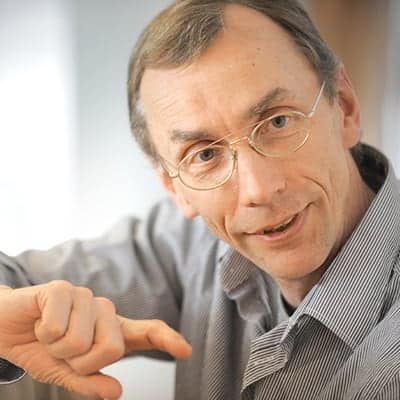NOMIS Awardee Svante Pääbo has been awarded the Nobel Prize in Physiology or Medicine 2022 “for his discoveries concerning the genomes of extinct hominins and human evolution.”
Through his pioneering research, Svante Pääbo accomplished something seemingly impossible: sequencing the genome of the Neanderthal, an extinct relative of present-day humans. He also made the sensational discovery of a previously unknown hominin, Denisova. Importantly, Pääbo also found that gene transfer had occurred from these now extinct hominins to Homo sapiens following the migration out of Africa around 70,000 years ago. This ancient flow of genes to present-day humans has physiological relevance today, for example affecting how our immune system reacts to infections.
In a telephone conversation recorded just after he had heard news of the award of his Nobel Prize, Pääbo reflects on our relationship to extinct species of early hominins and how his exploration of their genetics might influence our view of ourselves and our place in nature.
Watch Thomas Perlmann, Secretary-General of the Nobel Assembly, announce the 2022 Nobel Prize in Physiology or Medicine to Svante Pääbo:
Scientific background: Discoveries concerning the genomes of extinct hominins and human evolution
The 2022 Nobel Prize in Physiology or Medicine is awarded to Svante Pääbo for his discoveries concerning the genomes of extinct hominins and human evolution. The relationship between Homo sapiens and extinct hominins has long been a topic of great interest. Paleontology and archeology are important for studies of human evolution. Modern DNA technology provides opportunities to investigate our ancient past with more precision. However, due to extreme technical challenges resulting from degradation of DNA during tens of thousands of years and contamination from micro-organisms and contemporary humans, it was long questionable whether the analysis of archaic DNA from extinct hominin forms would be possible. Through extensive technological developments, Svante Pääbo set new rigorous standards in this challenging area and succeeded in obtaining the genome sequence of our closest extinct relative, the Neanderthal. This was followed by his sensational discovery of another extinct hominin, the Denisova, entirely from genome data retrieved from a small finger bone specimen. Svante Pääbo’s work further established that Homo sapiens had mixed with Neanderthals and Denisovans during periods of co-existence, resulting in introgression of archaic DNA in present-day humans. Striking examples of archaic gene variants that influence the physiology of present-day humans have already been demonstrated in a research field that is now highly dynamic. Through his groundbreaking discoveries, Pääbo opened a new window to our evolutionary past, revealing an unexpected complexity in the evolution and ad-mixture of ancient hominins, as well as providing the basis for an improved understanding of genetic features that make us uniquely human.
Continue reading about the scientific background online, or download the pdf
Svante Pääbo’s 2017 NOMIS Distinguished Scientist and Scholar Award film portrait
About the Nobel Prize
Awarded for “the greatest benefit to humankind”
Between 1901 and 2021, the Nobel Prizes and the Sveriges Riksbank Prize in Economic Sciences in Memory of Alfred Nobel were awarded 609 times to 975 people and organisations. The Nobel Prize is an international award administered by the Nobel Foundation in Stockholm, Sweden, and based on the fortune of Alfred Nobel, Swedish inventor and entrepreneur. In 1968, Sveriges Riksbank established The Sveriges Riksbank Prize in Economic Sciences in Memory of Alfred Nobel, founder of the Nobel Prize. Each prize consists of a medal, a personal diploma, and a cash award.
Related news
Nature: Geneticist who unmasked lives of ancient humans wins medicine Nobel



